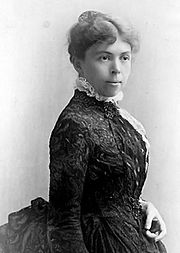Alice Freeman Palmer
| Alice Elvira Freeman Palmer | |
|---|---|

Alice Freeman Palmer, 1881-1887,
Wellesley College |
|
| Born |
February 21, 1855 Colesville, New York |
| Died | December 6, 1902 (aged 47) Paris, France |
| Resting place | Houghton Chapel, Wellesley College, Wellesley, MA |
| Education |
|
| Occupation |
|
| Spouse(s) | George Herbert Palmer (d. 1933) |
| Parent(s) | James and Elizabeth Freeman |
Alice Freeman Palmer (February 21, 1855 – December 6, 1902) was an American educator. As Alice Freeman, she was President of Wellesley College from 1881 to 1887, when she left to marry the Harvard professor George Herbert Palmer. From 1892 to 1895 she was Dean of Women at the newly founded University of Chicago.
She was an advocate for college education for women, improving their opportunities to attend college through improved college preparation, sponsorship, public lectures, and in her role in many education organizations. She was co-founder and president of the Association of Collegiate Alumnae, which later became the American Association of University Women. She was inducted into the Hall of Fame for Great Americans.
She called for women to attain a college education so that if they needed to support themselves, they would have the necessary skills to do so. An independent and effective person, unique for her time, was the model New Woman of the 19th century.
Alice Elvira Freeman was born in Colesville, New York, was the eldest child of four children of Elizabeth Josephine Higley and James Warren Freeman. From her father, she acquired her "moral beauty", as well as her height and red highlights in her hair. Palmer was particularly close to her mother during her childhood, partly because her mother was only 17 years-of-age when she was born, and also because of their shared responsibility caring for her younger siblings and performing household duties. Elizabeth was an advocate for children and women's rights and health care, as well as the temperance movement. Her father, a farmer in her early years, was interested in making direct changes to people's lives, rather than through reform movements, and shared his interest in education and the sciences with his daughter.
...
Wikipedia
